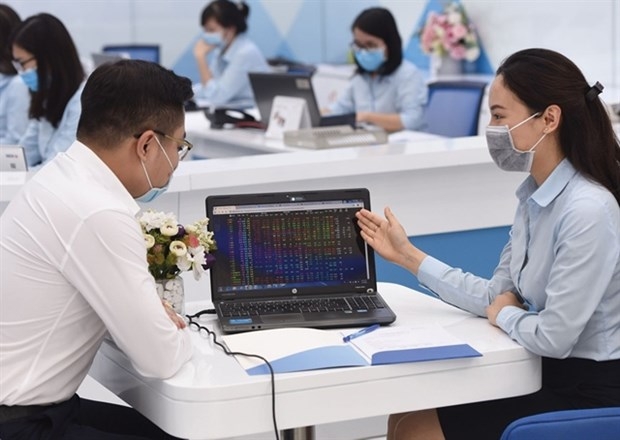Tweaking Vietnam’s stock attraction
 |
| Tweaking Vietnam’s stock attraction- illustration photo |
Last month, the Ministry of Finance released a new draft circular that may replace 2015’s Circular No.203/2015/TT-BTC on guidelines for trading on the securities market. Accordingly, the amendments cover some new changes that allow for covered short positions – short selling and settlement dates of intraday trading (T+0).
In general, short sellers commonly borrow shares and immediately sell them, betting the price will fall before they buy back the shares and return them to the lender, taking the price difference, or margin, as profit.
Theoretically, short-selling is a bet that the price of a stock will fall, and is considered a risky but quite lucrative trading strategy mostly applied by large funds.
At the moment, the domestic stock market applies T+3, as the settlement date for securities transactions referring to the obligation in the brokerage business to settle securities trades by the third day following the trade date.
This is an important factor for global investors and index providers, as well as being integral to the development of liquid, robust capital markets that can support economic growth and prosperity, said Pan Asia Securities Lending Association on its optimism of Vietnam’s forthcoming bold moves.
Although short selling and T+0 are not the key factors for the reclassification of Vietnam as an emerging market, the new initiatives could boost the stock market to thrive, as well as lure more overseas funds, if the draft is approved.
To be classified as an emerging market through the MSCI, Vietnam must have “Good and tested efficiency of operational framework”. Efficiency of operational framework includes market entry, market organisation, and market infrastructure.
Within market infrastructure, there are criteria about clearing and settlement, as well as short selling. MSCI does not specify which criterion is critical for the reclassification. Therefore, if short selling and T+0 are legally permitted, Vietnam may pass these criteria.
In the list of emerging markets, more than half of the countries allow short selling to some extent. That means short selling criterion is not a requirement but a plus point for the Vietnamese market to upgrade. Similarly, T+0 is not a requirement because there are many countries which do not allow T+0 settlement – but in the long run, T+0 and short selling is required for the market to upgrade to a developed one.
Meanwhile the FTSE market classification framework clearly outlines the criterion to upgrade to a secondary emerging market. There are nine criteria, of which Vietnam has passed seven. The conditions that Vietnam has not met are “the settlement cycle (DvP)” and “settlement - rare incidence of failed trades”.
FTSE stated that “Vietnam continues not to meet the DvP criterion, which is currently rated as restricted, due to the market practice of conducting a pre-trading check to ensure the availability of funds prior to trade execution”.
The FTSE does not rate “settlement – rare incidence of failed trades” criterion – therefore, the key for Vietnam to upgrade to emerging market status by FTSE is to not require pre-funding of trades. That issue is also addressed by MSCI in its Global Market Accessibility Review report.
Prefunding requirement of trades comes from Rule 7.2 in 2015’s Circular No.203/2015/TT-BTC on guidelines for trading on securities market. In the new draft circular, that rule is revised that “Before trading, investors must have all collateral assets (money or securities) in accordance with the law of clearing and settlement of securities transactions.” That means the prefunding of trades is still required but the collateral assets include both money and securities rather than only money as in Circular 203. That could be an improvement for the market but may not be enough to pass the DvP criterion.
The T+0 settlement cycle and short selling also may not help Vietnam to upgrade to emerging market status by FTSE but in the long-term, these new schemes could help Vietnam get promoted to developed market status. The T+0 settlement cycle and short selling may attract a huge number of investors, and the trading cycle of investors is also boosted. That in turn could improve the market attraction and liquidity.
The implementation of short selling in combination with long positions to buy cover warrants will create diversified strategies for investors to gain profit, while minimising risks in the process for portfolio managers, especially with large investment funds. That will be very important as the stock market is being negatively affected by the pandemic this year.
In general, T+0 trading cycles and short selling do not guarantee that Vietnam could gain a lift to emerging market status by MSCI and FTSE, but it could be an encouraging sign for market reclassification – the key comes from a pre-funding requirement of trades.
What the stars mean:
★ Poor ★ ★ Promising ★★★ Good ★★★★ Very good ★★★★★ Exceptional
Related Contents
Latest News
More News
- Cashless payments hit 28 times GDP in 2025 (February 04, 2026 | 18:09)
- SSIAM and DBJ launch Japan Vietnam Capital Fund (February 04, 2026 | 15:57)
- Banks target stronger profits, credit growth in 2026 (February 04, 2026 | 15:43)
- Vietnam on path to investment-grade rating (February 03, 2026 | 13:07)
- Consumer finance sector posts sharp profit growth (February 03, 2026 | 13:05)
- Insurance market building the next chapter of protection (February 02, 2026 | 11:16)
- NAB Innovation Centre underscores Vietnam’s appeal for tech investment (January 30, 2026 | 11:16)
- Vietnam strengthens public debt management with World Bank and IMF (January 30, 2026 | 11:00)
- Corporate bond market poised for stronger growth cycle (January 28, 2026 | 17:13)
- Vietnam's IPO market on recovery trajectory (January 28, 2026 | 17:04)

 Tag:
Tag:




















 Mobile Version
Mobile Version